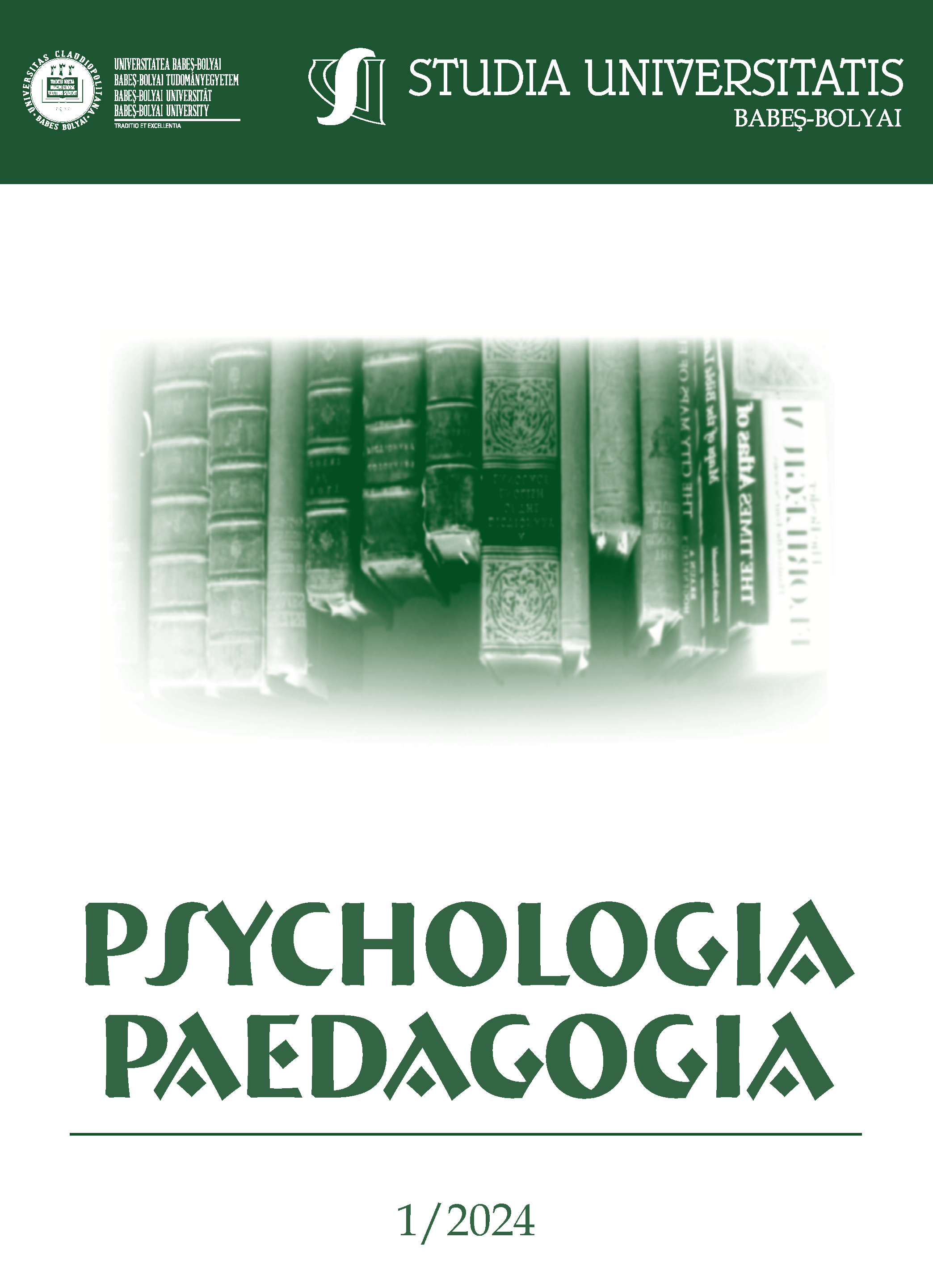Undergraduate Students’ Opinion on Digital Learning in a Post-pandemic Era: A Case Study
DOI:
https://doi.org/10.24193/subbpsyped.2024.1.04Keywords:
higher education, digital learning, online learning, pandemic, good teaching practices.Abstract
The current article aims to investigate learners’ post-pandemic attitude towards digital learning in Higher Education with a specific focus on a group of undergraduate Law students at Babes-Bolyai University from Cluj-Napoca, Romania. To achieve its purpose, the article focuses on answering two research questions: Do post pandemic undergraduate students recognize the benefits of digital learning? Is e-learning currently a reasonable choice for them? The research is designed as an exploratory case study that uses three data collection tools: a questionnaire, an interview, and a classroom observation protocol. The article links information from literature related to the use of digital learning during the pandemic with results revealed by the data collected in the case study. The results suggest a steady trend towards a growing acceptance rate of digital learning by the targeted student population and a lower approval rate of e-learning.
ZUSAMMENFASSUNG. Der aktuelle Artikel zielt darauf ab, die Einstellung der Lernenden nach der Pandemie zum digitalen Lernen in der Hochschulbildung zu untersuchen, wobei der Schwerpunkt auf einer Gruppe von Jurastudenten im Grundstudium an der Babeș-Bolyai-Universität aus Cluj-Napoca, Rumänien, liegt. Um sein Ziel zu erreichen, konzentriert sich der Artikel auf die Beantwortung zweier Forschungsfragen: Erkennen Studierende nach der Pandemie die Vorteile des digitalen Lernens? Ist E-Learning derzeit eine sinnvolle Wahl für sie? Die Forschung ist als explorative Fallstudie konzipiert, die drei Datenerfassungstools verwendet: einen Fragebogen, ein Interview und ein Beobachtungsprotokoll im Klassenzimmer. Der Artikel verknüpft Informationen aus der Literatur zum Einsatz digitalen Lernens während der Pandemie mit Ergebnissen, die sich aus den in der Fallstudie erhobenen Daten ergeben. Die Ergebnisse deuten auf einen stetigen Trend hin zu einer steigenden Akzeptanzrate des digitalen Lernens durch die Zielgruppe der Studierenden und einer geringeren Zustimmungsrate von E-Learning hin.
Schlüsselwörter: Hochschulbildung, digitales Lernen, Online-Lernen, Pandemie, gute Lehrpraktiken
References
Agung, N. et al. 2020. Students’ Perception of Online Learning during COVID-19 Pandemic: A Case Study on the English Students of STKIP Pamane Talino. Journal of Social Sciences and Humanities] Volume 10, Number 2, 2020. p-ISSN. 2088-2262 e-ISSN. 2580-5622 ojs.pnb.ac.id/indexphp/SOSHUM/
Basak, K. et al. 2018. E-learning, M-learning, and D-learning: Conceptual definition and comparative analysis. E-Learning and Digital Media 2018, Vol. 15(4) 191–216. sagepub.co.uk/journalsPermissions.nav DOI: 10.1177/2042753018785180
Bretan, B. 2022. Is the Future Hybrid? An Analysis of Opportunities for Digital Education. Studia Universitatis Babes-Bolyai, Philologia 4: 225-238. doi: 10.24193.
Capranos, D, Dyers, L and Magda A. 2021. Voice of the online learner 2021: Amplifying student voices in extraordinary times. Louisville: Wiley Education Services. https://edservices.wiley.com/wp-content/uploads/2021/09/202108-VOL-reportWES-digital-FINAL-Revised.pdf
Carolan, C., et al. 2020. COVID19: Disruptive impacts and transformative opportunities in undergraduate nurse education. Nurse Educ. Pract. 46:102807. Doi: https://doi.org/10.1016/j.nepr.102807
Chirobocea-Tudor, Olivia. 2021. Learners’ Attitude towards Online Education during the COVID-19 Pandemic with Focus on ESP. Ovidius University Annals. Economic Sciences Series. 21. 10.61801/OUAESS.2021.1.33.
European Commission, Directorate-General for Education, Youth, Sport, and Culture, Humpl, S., Andersen, T. 2022. The future of digital and online learning in higher education, Publications Office of the European Union, https://data.europa.eu/doi/10.2766/587756
Felea, C. 2020. Online on a Dime – Reactions, Challenges and Potential Benefits for Teaching English for Specific Academic Purposes in Higher Education. Innovative approaches in specialized languages (Romanian), Cluj University Press, 15-29.
Finlay, M. J., Tinnion, D. J., & Simpson, T. 2022. A virtual versus blended learning approach to higher education during the COVID-19 pandemic: The experiences of a sport and exercise science student cohort. Journal of Hospitality, Leisure, Sport & Tourism Education, 30, 100363. https://doi.org/10.1016/j.jhlste.2021.100363
Humpl, Stefan & Andersen, Tine. 2022. The Future of Digital and Online Learning in Higher Education. Luxembourg: Publications Office of the European Union.
Iqbal, S.A., Ashiq, M., Rehman, S.U., Rashid, S., & Tayyab, N. 2022. Students’ perceptions and experiences of online education in Pakistani universities and higher education institutes duringCOVID-19. Education Sciences, 12(3), 166. https://doi.org/10.3390/educsci12030166
Khan, S., Kambris, M. E. K., & Alfalahi, H. 2022. Perspectives of university students and faculty on remote education experiences during COVID-19: a qualitative study. Education and Information Technologies, 27, 4141-4169. https://doi.org/10.1007/s10639-021-10784
Nemes, B., 2021. The Online Classroom. Students’ Perception of Online Learning Activities and Educational Platforms: Benefits, Barriers, and Solutions. Innovative approaches in specialized languages (Romanian), Cluj University Press, 103-117.
Nikolopoulou, K. 2022. Face-To-Face, Online and Hybrid Education: University Students’ Opinions and Preferences. Journal of Digital Educational Technology, 2(2), ep. 2206. https://doi.org/10.30935/jdet/12384
Nikolopoulou, K., & Kousloglou, M. 2022. Online teaching in COVID-19 pandemic: Secondary school teachers’ beliefs on teaching presence and school support. Education Sciences, 12(3), 216. https://doi.org/10.3390/ educsci12030216
Olson, T. M., and R. A. Wisher. 2002. The effectiveness of web-based: An initial inquiry. International Review of Research in Open and Distance Learning, 3(2) (online). http://www.irrodl.org/index.php/irrodl/article/view/103/182. (Accessed 21 April 2023).
Ortagus, J. 2020. What we know about the cost and quality of online education. The third Way, September 2, 2020. https://www.thirdway.org/report/what-we-know-about-the-cost-and-quality-of-online-education (Accessed 16 May 2023).
Pongkendek, J. J., Ahmar, D. S., Munandar, H., & Azzajjad, M. F. 2021. Student perceptions of online learning during the COVID-19 pandemic. EduLine: Journal of Education and Learning Innovation, 2(1), 1-16. https://doi.org/10.35877/454RI.eduline607
Pozo, Juan-I., María-Puy Pérez Echeverría, Beatriz Cabellos, and Daniel L. Sánchez. 2021. Digital Technologies in Education During COVID-19: Activities, Learning Outcomes, and Teacher Profiles. Frontiers in Psychology. doi: 10.3389/fpsyg.2021.661149. (Accessed 22 February 2024).
Zapata-Cuervo, N., Montes-Guerra, M. I., Hailey Shin, H., Jeong, M., & Cho, M.-H. 2021. Students’ psychological perceptions toward online learning engagement and outcomes during the COVID-19 pandemic: A comparative analysis of students in three different countries. Journal of Hospitality & Tourism Education. https://doi.org/10.1080/10963758.2021.1907195
Downloads
Published
How to Cite
Issue
Section
License
Copyright (c) 2024 Studia Universitatis Babeș-Bolyai Psychologia-Paedagogia

This work is licensed under a Creative Commons Attribution-NonCommercial-NoDerivatives 4.0 International License.





